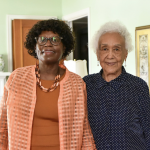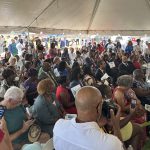By Barnett Wright
The Birmingham Times
When an initially blinded, and nearly lifeless, 12-year-old girl found in the rubble of a church bombing was wheeled onto the 10th floor of University Hospital in Birmingham nearly 60 years ago, one of the first people to tend to the child was Rosetta “Rose” Hughes, a nurse on the floor.
It was Hughes who stayed with Sarah Collins, the “fifth little girl” in the bombing, until a doctor arrived on that momentous Sunday, as an unforgettable chapter was being etched into the city’s history.
Hughes was on duty on Sept. 15, 1963, when a bomb demolished the Sixteenth Street Baptist Church, killing Addie Mae Collins, 14; Denise McNair, 11; Carole Rosamond Robertson, 14; and Cynthia Wesley, 14 and injuring dozens of parishioners.
One of the surviving girls was Sarah Collins, sister of Addie Mae. On that Sunday, staff at the emergency clinic at University Hospital received the bodies of the four children killed and tended to scores of others who were injured. Sarah Collins was among the wounded, and one of the first to see her was Hughes.
“When I saw her that Sunday, … she was just covered with soot and ashes [and blood],” Hughes recalled in an exclusive interview with The Birmingham Times. “[It] looked like she was gone. … I thought she wasn’t going to wake up. … She was not moving.”
That was 59 years ago.
Next week, on September 15, Birmingham will commemorate the explosion that proved to be a turning point in the Civil Rights Movement, became a catalyst for change in the United States, and ultimately prompted global efforts for equality and human rights.
Hughes, who turns 101 in October and still lives in Birmingham, is believed to be one of the last remaining workers on duty at the hospital the day of the bombing.
Last month, for the first time since the bombing, Hughes and Collins-Rudolph, now 71, reunited for their first one-on-one, lengthy discussion of the events on that pivotal day in world history.
“It’s more than a blessing to meet her because she took care of me,” Collins-Rudolph said during the interview. “When I was younger, I didn’t know how she looked or anything because I was practically blind then. So, just to see her now and know her is a blessing. She’s looking real good.”
The nearly-hour-long reunion took place in Birmingham’s Titusville community, where Hughes lives.
Hughes recalled working on the 10th floor of University Hospital, which was known as the “Eye” floor, on Sunday, Sept. 15, 1963, when young Sarah was wheeled in.
“I remember they brought her to the emergency room, and I was working on the Eye floor. We had the surgery up there, and they sent her to eye surgery. … She was on a stretcher, and I took care of her until they called the doctor to come in,” said Hughes, who recalls the doctor’s name only as “Pearson” and that he arrived with a toddler.
Medical staff from across the city were being called in to help with the influx of patients. Many of the doctors were scheduled to be off that weekend, and that likely included Dr. Pearson, who came to the hospital with his son. While Hughes could not remember the doctor’s first name, University of Alabama at Birmingham (UAB) records show a “Dr. Robert S. Pearson” as a resident in ophthalmology at the facility in the early 1960s.
Dr. Pearson also had three children, two boys and a girl, which makes it highly likely that he was the doctor who treated Collins-Rudolph. Dr. Pearson, who would eventually become a partner with Ophthalmology Associates and Alabama Eye Surgery, passed away in 2008.
“It was a Sunday morning, and the doctor’s wife had gone to church, so he was watching the baby and had to bring him [to the hospital]. … I babysat while [Dr. Pearson] checked on Sarah,” Hughes recalled.
The toddler was around 2 years old and “wasn’t any trouble,” Hughes said. “He was just walking around. I watched the baby maybe about two or three hours. The doctor came, and his nurse came, and they took [Collins-Rudolph] back to the operating room.
“[Dr. Pearson] came back out and sent her back downstairs to the where she was examined at first. … They took her back on a stretcher. She was still asleep…and I didn’t have to do anything. I just had to watch her. She was also covered with ashes and smoke.”
Vivid Memories
Even though she was 12 at the time of the bombing, Collins-Rudolph, still has vivid memories of what happened.
“That’s one day I will never forget,” she said. “I remember, you know, when they operated on my eyes. … I remember when they took the glass out of my eyes, glass from my face. … The doctor had told me there were about 20 to 26 pieces of glass in my face altogether.
“I know when the doctor operated on my eyes, they put this bandage on it. … Maybe about a week later, they took the bandage off. At first, the doctor asked me, ‘What do you see out of your left eye?’ I told him, ‘I just see a little light.’ He asked me the same question [about my right eye]. I said, ‘I can’t see anything.’ So, he said I was blinded instantly in my right eye.
“When [the doctor] was talking to my mother, I remember hearing him tell her that eventually I would start seeing out of my left eye because I was real young and the sight would start coming back. When I was getting ready to leave the hospital, I remember [the doctor] telling [my mother] to bring me back in February [1964] because they were going to have to remove my right eye, and that’s what they did. I went back in February, and that’s when they removed my right eye and fit me with a prosthetic.”
Sarah has had problems with her eyesight for the past 59 years. She developed glaucoma in her left eye and was initially given drops for the eye.
“That didn’t work too good, and they tried another drop. It didn’t work too good either, so they tried a third drop,” she recalled. “When the drops stopped doing any good, [the doctor] said he would have to operate and give me an incision in that [left] eye. They put an incision in there to drain the fluid. … If he had not done that, I would have gone blind.”
Even today, Collins-Rudolph still must visit an eye doctor every six months.
“I had to pay for that out of my own pocket,” she said. “I would always wonder to myself, … ‘I was in that bombing, and I got hurt. How come I had to foot these bills by myself when it wasn’t my fault?’”
Collins-Rudolph called on the state of Alabama to issue a formal apology and compensate her “to right the wrongs that its past leaders encouraged and incited,” she said. In September 2020 Alabama Governor Kay Ivey apologized “without hesitation or reservation” to Collins-Rudolph by saying, “There should be no question that the racist, segregationist rhetoric used by some of our leaders during that time was wrong.”
“The Bomb Went Off”
On the day of the church bombing, Collins-Rudolph remembered it being a good morning when she and her sisters walked to church from their Smithfield home.
“It was Youth Day, and we were going to take up the offering. [The kids] were going to do all the things the adults usually do,” Collins-Rudolph told the Birmingham Times in a previous interview.
Collins-Rudolph and her sisters had been in Sunday school before entering the restroom.
“When Sunday school ended, [Addie Mae and I] were still in the ladies’ lounge, but [our older sister], Junie, had gone to her class,” Collins-Rudolph said. “I was waiting for class to [end], and I saw [Carole, Denise, and Cynthia] come in. We stayed in with them. They went and used the restrooms, while Addie and I were standing in the lounge. She was standing right by the couch, and the couch was right where they had placed the bomb. When [the girls] came out of the restroom, they all came out together and went over to Addie. That’s when Denise asked Addie to tie the sash on her dress. I was standing by the sink, and we all stood there waiting to see her tie it.
“That’s when the bomb went off. Boom! By the time [Addie] reached her hand out to tie [Denise’s sash], the bomb went off. The debris came from the [shattered] glass window and blinded me. All I could do was say ‘Jesus!’ because it scared me so bad. Then I called out, ‘Addie! Addie!’ The first thing I thought was that they ran back into the Sunday school area. I didn’t have any idea that they all had perished.”
Collins-Rudolph said one of the church’s deacons rescued her.
“I heard somebody holler, ‘Somebody bombed the Sixteenth Street Church,’” she said. “I was told that a deacon, Samuel Rutledge, jumped down because the bomb had blown the steps away. He jumped down, looked in there, saw me bleeding, came in and got me, and took me out the hole that the bomb blew. When he took me outside, the ambulance was already waiting. He put me in the ambulance.”
The girls weren’t the only ones killed that day. While the names of the four little girls killed are etched in the nation’s memory, Johnny Robinson, 16, was killed by a police officer’s shotgun in North Birmingham that same afternoon, and an hour or so later, Virgil Ware, 13, was gunned down by a white teenager on a road in Jefferson County.
“No Screaming, Only Crying”
The church bombing and the deaths of the girls, coupled with the 1963 citizens’ marches in Birmingham, were harbingers of change for racial justice in the United States that eventually led to the Civil Rights Act of 1964 and ultimately initiated international efforts for equality and human rights.
The Sixteenth Street Baptist Church was the first Black church to organize in Birmingham in 1873. Throughout its history, many prominent Black residents were members, and noted dignitaries often spoke at the well-known place of worship. In the 1960s, Sixteenth Street served as a center of activity for the growing movement against racism in Birmingham and across the South. Because of that, it became a target.
At the time of the explosion, about 200 parishioners were in the building, which was wrecked by an estimated 15 to 19 sticks of dynamite planted by members of the Ku Klux Klan (KKK) under the east-side stairs adjacent to the basement wall.
“We were all in Sunday school classrooms when the bomb went off,” recalled Sunday School teacher Effie J. McCaw, who was in the building when the blast occurred. “I told the children in my class to lie on the floor. The teachers kept the congregation from panicking. We couldn’t get to the children in the basement. Everyone walked outside in a hurry. There was no screaming, only crying.”
On the day of the bombing, the Rev. John Cross, then-pastor of Sixteenth Street Baptist Church, was in the Women’s Bible Study Class, which met on the Sixteenth Street side of the building. He was leading a lesson his parishioners didn’t know they would soon need.
“It was a wonderful lesson, too: ‘a love that forgives,’” he said in an interview for the Birmingham Civil Rights Institute’s Oral History Project. “People seem to have love, but they don’t know how to forgive.”
“I Recognized the Shoe”
Victims of the bombing were brought to the Hillman Emergency Clinic at University Hospital. Those inside the clinic were elbow to elbow. Some were injured. Some were family. Some were onlookers.
The emergency room staff had been alerted about a church bombing and received instructions to be prepared for trauma patients and the injured.
“Extra police came in with submachine guns and lined the halls,” Betty Ruth Speir, M.D., then a medical resident at the hospital, told me in a 2014 interview. “It was just chaos. People came in with cut legs, cut heads. Some had been beat in the head, knocked out. We had all kinds of injuries. … There was one laceration after another.
“The [four] girls came through Hillman as dead on arrival. I don’t know if I saw them, but I did see and deal with the parents and their families. They were crying and falling out. It was one of the worst things that I have ever experienced in my whole life. It was horrible.”
An emergency room professional who did attend to the girls was Dr. Alan Dimick, who was in charge of the Hillman Emergency Clinic. That Sunday morning, he received a call about a church bombing and was told to expect casualties.
A Mountain Brook resident at the time, Dimick arrived at the hospital between 11 a.m. and noon, shortly after the bodies of the girls had been brought in. As part of the team that pronounced the deaths of the girls, all of whom were killed in a basement bathroom of the Sixteenth Street Baptist Church, Dimick was one of the doctors tasked with informing the parents that their daughters had died.
The remains could not be identified, Dimick remembered, so the parents were “the ones who identified the children so that we knew their names. There was tremendous emotion, as you can imagine, losing a young child like that.”
Another eyewitness at the hospital was Mamie Grier, a Sixteenth Street Baptist Church member whose account few have heard. Grier, a superintendent of the church’s school and a program specialist with the Birmingham Board of Education, was interviewed on Nov. 19, 1975, as part of an Oral History Project at UAB. A transcript of the interview has been part of the school’s archive for the past 47 years, with few knowing it was there.
In her interview, Grier remembers the morning before the church bombing as a “very beautiful day in anticipation of the youth activities which were to begin at 11 a.m.” She remembers the girls in the downstairs lounge “dressed in white because they were to serve as ushers and choir members. … This was a Sunday set aside for youth,” Grier said, according to a review of the transcript.
She spent some of that morning talking to the girls in the lounge before heading upstairs to sit with Maxine McNair, mother of Denise, who was one of the girls in the downstairs lounge. Grier and McNair were discussing “Love,” the theme of that day’s service, and how “that would solve the problems of the world if everybody loved. All of a sudden, there was this loud sound. … We were stunned, and Mrs. McNair sort of stretched out on the seat and said, ‘Oh my goodness,’” Grier said in the transcript.
McNair would later learn her daughter was killed in the blast.
According to the transcript, Grier said she walked around the back of the church and down an alley between the church and a house until she reached a sidewalk, where someone ran up to her and said, “Your husband was taken to the hospital in the first ambulance that came.”
“That sort of did it for me because I could look around and see other people bleeding and, uh, I said then, ‘[My husband] must be nearly dead,’” recalled Grier, whose husband had been in the Young Men’s Bible Class at the time of the bombing.
She needed to get to the hospital where he was taken, but her car, like others near the church, had been damaged, “some beyond repair,” Grier said.
“My car was parked at the corner of Sixteenth Street and Sixth Avenue, and when I neared my car, I could see it had a huge hole in the door,” she said.
Grier would eventually get a ride to the hospital and meet up with her husband, whose shirt was blood-soaked from a gash in his head. Even more shocking was what she saw outside the hospital when the bodies of the girls arrived.
“I was standing there when the ambulance came,” Grier said in the transcript. “The first ambulance came, and, uh, I recognized the shoe—because one little girl’s foot was not covered by the sheet. You knew she was dead because the body was covered, but I could see a foot and then I realized [by the shoe] that that was one of the girls with whom I had talked. … The next one almost had to be picked up as you would a bundle of laundry, when they picked up the body, you know, to carry it inside.”
With the bodies coming in, the girls’ relatives were taken to a second-floor conference room, a quiet place to cope with the morning’s horror.
“Blessing to be Together”
Meanwhile, Nurse Hughes was on the 10th floor with young Sarah Collins. Hughes was born in Eutaw, Alabama, in October 1921. She was educated in Greene County, Alabama, Schools and completed the Western-Olin Practical Nursing Program in 1958.
Hughes moved to Birmingham in 1948 and lived in the Smithfield community, initially. She eventually moved to her current home in Titusville, where she has lived for 75 years. She married the late George Milton Hughes, and they have three daughters. She’s worked at the Veterans Administration (VA), as well as University and Cooper Green Mercy hospitals. She retired in 1983, at age 62.
Hughes said she grew up in “the country” and moved to Birmingham “when my husband got a job at [American Cast Iron Pipe Company (ACIPCO)] and my baby was 10 years old. … I decided to go to nursing school. This was a Black class. We went to trade school at Western-Olin, which became Jackson-Olin. I made the highest grade at state board, so they hired me,” she said.
Hughes shared her story with Collins-Rudolph during The Birmingham Times interview as she listened intently. “I trust God and live,” Hughes said. “He takes care of me.”
Collins-Rudolph also talked of her journey, and she credits God for helping her get through some rough periods, saying she said she had lost her way until “I got my life right with God, and I repented my sins.”
“I stay in church, … and that’s what kept me. That’s what helped me really,” she continued. “I go to [I Care Christian Ministries (ICCM)]. Before, when [the bombing] first happened, I was just wandering round like in the wilderness, you know? I didn’t know what to do. I was smoking marijuana. I was drinking alcohol. I did all [of that] to get myself calmed down. I didn’t get counseling, … so I went the way I knew to go to alcohol and smoking marijuana until I came to God. When I came to Jesus, that’s what helped me. I’ve been with Him all this length of time.”
At the reunion with Hughes, George Rudolph, who has been at Collins-Rudolph’s side for the past two decades and knows about survival after his first tour of duty as a 19-year-old during the Vietnam War, said his wife has strength he has not seen.
“For my wife to survive what she went through and not hold any animosity toward the KKK because she forgave them, that’s a strong person,” he said. “She didn’t want to hold her hatred in her heart for those Klansmen. When she said, ‘I forgive you,’ that was such a powerful statement. Very powerful. … She is just a strong Black lady and amazing. I love my wife. I thank God for Sarah.”
Collins-Rudolph and Hughes remembered that they may have met in passing at a luncheon several years ago at an Applebee’s restaurant, but they never talked about their moment in history.
Until their recent reunion in Titusville.
“It’s a blessing to be together,” Collins-Rudolph said. “I didn’t get a chance to see her when I was in the hospital. Now I see her, and it’s a blessing. She’s such a nice lady. God kept us together this long to get together again. It’s been so many years, but He really has blessed us to come together again.”












